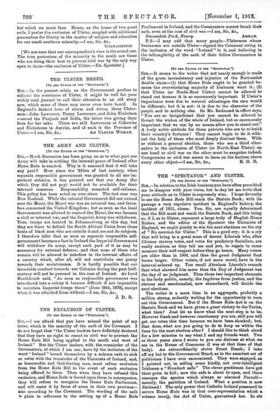THE ARMY AND 'ULSTER.
LTO THE EDITOR OE THE " SPECTATOR."]
SIR,—Much discussion has been going on as to what part our Army will take in settling the internal peace of Ireland after Home Rule is enacted. Why is it assumed that it will take any part ? Ever since the 'fifties of last century, when separate responsible government was granted to all our im- portant colonies, it was pointed out that our Army (for which they did not pay) would not be available for their internal concerns. Responsibility connoted self-reliance. This policy has been acted on ever since. The test case was New Zealand. While the colonial Government did not extend over the Maori, the Maori war was an external war, and there- fore concerned the United Kingdom ; but as soon as the local Government was allowed to control the Maori, the war became a civil or internal war, and the Imperial Army was withdrawn. True, troops are located in Johannesburg at this day, but they are there to defend the South African Union from those hosts of black men who are outside it and are not its subjects. I therefore infer that as soon as separate responsible self- government becomes a fact in Ireland the Imperial Government will withdraw its army, except such part of it as may be necessary for external defence ; and that none of those who remain will be allowed to interfere in the internal affairs of a country which, after all, will not contribute one penny towards their maintenance. It is hardly possible that our invariable conduct towards our Colonies during the past half- century will not be pursued in the case of Ireland. As Lord Northbrook said, "As soon as resPonsible government was introduced into a colony it became difficult if not impossible to maintain Imperial troops there" (June 26th, 1870), except when it was attacked from without.—I am, Sir, &c., J. D. R.






























































 Previous page
Previous page